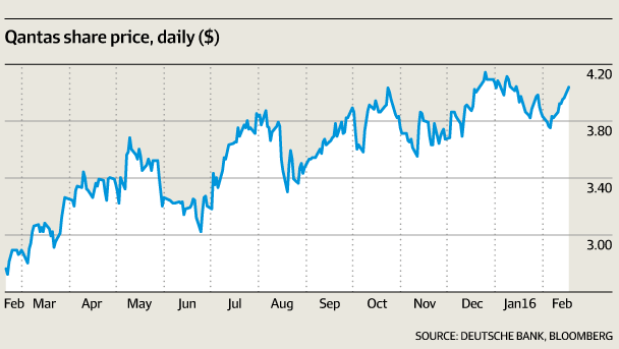An apology to Alan Joyce, CEO of Qantas Airways
Two years ago I publicly called for the sacking of Qantas CEO Alan Joyce.
Blaming him for trashing the airline's brand by grounding the fleet, poor customer service and engaging in a futile market share war with Virgin that was costing both airlines hundreds of millions of dollars, I made a foolish prediction.
"Joyce", I proclaimed, "will go, probably sooner rather than later, at which point we can expect a more rational, less confrontational approach".
Not only does Joyce remain in the corner office, in a few short years he's turned a $300 million half-year pre-tax loss into a $921 million half year profit.
The share price has rocketed, up from a $1.12 at the time of the 2014 half-year profit result to $3.79 on Tuesday, the day of the latest result – an increase of 238 per cent.
Joyce also announced a dividend and a share buyback, something that airlines do not usually do, especially one that just two years ago declared a state of emergency and asked the government to guarantee its debt.
This is a company near the top of its game.
There are three reasons for the turnaround. First, Joyce got lucky, which in this industry is a prerequisite to making money.

The plunging oil price saved the airline $448 million. Nor were there many of the usual events that bedevil this industry; volcano eruptions, crashes, staff strikes, bird strikes, pandemics and economic troubles have been largely absent.
Joyce can claim more credit for the two remaining reasons for the turnaround.
First, he stopped the capacity war with Virgin Australia, returning the domestic air travel market into a more comfortable, profitable duopoly.
For years, Joyce stuck to the company policy of dumping capacity onto domestic routes to foil Virgin's advance. This was an incredibly expensive and pointless battle. Great for passengers, but awful for everyone else.
Joyce eventually realised that if Qantas was to ever turn another profit (and people like me were to shut up), he had to take the airline to a more "rational" competitive environment, one where the major players tacitly agree to compete with each other, but not too much.
That's what we've got now.
If a CEO is willingly and publicly banging his head against a wall and decides to stop for the benefit of shareholders, he deserves credit for it.
Joyce has also led the airline to $262 million in cost savings, part of a $2 billion airline transformation program. Plenty of companies announce programs like these, but few deliver on them. Joyce seems to be doing so.
So, after Joyce has recognised the error of his ways, do I see the error of mine? Will I be investing in Alan's new Qantas?
Not on your life.
In an industry where the next disaster is only a matter of time, even the best management teams can come unstuck. Luck is a bigger factor in this industry than almost any other.
The absence of disasters, plus a lower oil price, helped boost the recent half-year profit. Their return, plus a higher oil price, could easily decimate the next one.
That's why investing in airlines is so difficult.
You need a lot of luck for things to work out because so many factors affecting profitability are beyond the control of management.
This is the essential truth of the industry: under every impressive airline result is a bad business itching to get out.
Only time will tell whether Joyce departs before the poor business reappears.
But whenever that might be, I for one won't be predicting it. In the meantime, my apologies to Alan Joyce, who has ridden his luck well and made some of it, too.
Disclosure: John Addis does not own shares in Qantas.









